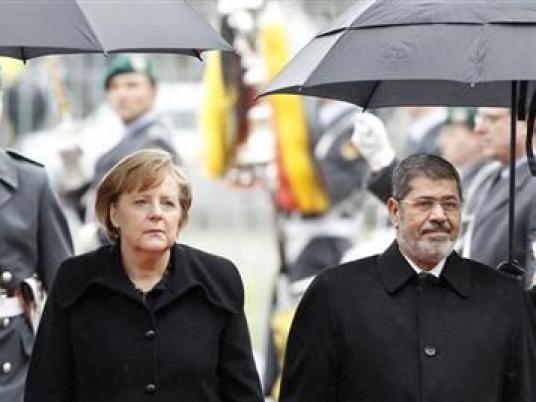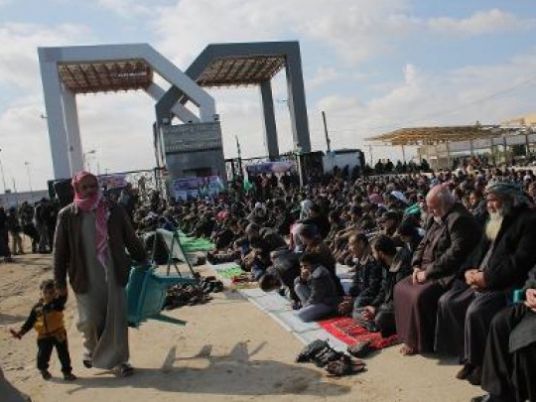
The floundering negotiations over the controversial US$4.8 billion loan from the International Monetary Fund (IMF), which the government has been going back and forth over for more than a year, is choking off a flood of other funding to the country.
The loan’s approval is also a legal precursor for a series of other loans, grants and initiatives to be administered.
Though the loan has been heralded as an international stamp of approval upon the country’s economy that would invite the return of international investors, there has been little public discourse about the large amount of funding from other institutions and countries that has also been made contingent upon its delivery.
In fact, much of this funding, which experts estimate to be at least three times that of the IMF loan’s value, was announced in the aftermath of the uprising in January 2011. At the time, it was praised as a show of support and solidarity.
But despite the celebration and reportage, this money has yet to be transferred to the government.
What many experts and economists fear is that if Egypt continues to be unable to commit to the IMF loan, the failed negotiations will only lead to a bigger disaster than many Egyptians expect.
The government could end up short of a much larger sum than the $4.8 billion in budgeted help.
Conservative estimates put the total amount of contingent money at $14.5 billion. This includes $6.3 billion from the European Union (EU), $1 billion from the US and $500 million from the African Development Bank. The remainder comes from the World Bank and a smattering of other lenders.
Energy debt
It appears that there could be even larger sums of money tied up in the business community and a variety of government operations.
One example is the Egyptian General Petroleum Company, a branch of the Petroleum Ministry that extracts, refines and distributes the country’s fossil fuels in partnership with private petroleum companies. The company was promised nearly $2 billion to help balance its budget by the US-based financial service companies Morgan Stanley and JP Morgan.
Both firms tied their money to the IMF deal and show no sign of changing their tune.
Meanwhile, the Egyptian General Petroleum Company’s debt to international drilling companies is reaching a critical point. It has also been strained by having to get fuel from abroad for the country’s energy needs, after a dip in production. At the end of last year, Egypt turned into a net importer of energy.
Former presidential candidate Amr Moussa, once Egypt’s foreign minister, recently spoke out about the Petroleum Ministry’s multiplying debts. In a TV interview, he said Egypt owes billions of dollars in debt to international oil companies.
If the government is unable to pay, these companies are likely to involve Egypt in international arbitration proceedings between the Egyptian General Petroleum Company and the oil companies, which usually favor the foreign investor.
Apart from losing the capacity to nourish the nation’s energy needs, the country will be charged additional millions to cover its lawsuit fees if it were to be convicted in an international court.
The London-based consultancy Executive Analysis estimates that Egypt has accumulated debt to oil and gas producers worth $9 billion, according to Reuters.
Wait and see
Other banks and institutions with capital in the billions are also lined up behind the IMF bottleneck.
Economist and founder of The Signet Institute Angus Blair said there is help that otherwise would have been delivered from the European Bank for Reconstruction Development, the European Investment Bank and other governments around the world.
“There’s a lot at stake actually, in terms of confirmed help that is contingent on Egypt getting the IMF loan,” he said.
Another economist who spoke on condition of anonymity confirmed that a series of big-name investors from the EU, the Middle East and the US are all taking a wait-and-see approach to how the situation unfolds in Egypt.
“But not one penny will be invested in Egypt unless the country shows real initiative for change,” the source said.
And now, it seems the ball is in the Egyptian government’s court, as it tries to handle current social unrest and also implement economic reforms, such as a series of tax increases signed by President Mohamed Morsy on 6 December but not announced in the media until 9 December. After being made public for less than 12 hours, Morsy said the tax plan would be delayed until further social dialogue could be conducted. It has yet to be implemented.
It’s a tricky balancing act for the government, and the IMF and other institutions are waiting to see if the current regime can manage it without inflaming unrest or neglecting reforms.
Qatar not enough
Qatar’s generous financial gifts, deposited without process or open negotiation, have allowed the Egyptian government to keep from sinking into serious disaster. Some experts have said the amount given by the Qatari government — about $5 billion — may have allayed Egyptian officials’ sense of urgency, and could explain the government’s slow reaction time to the country’s economic crisis.
But economists and financial specialists say that even Qatar’s deep pockets are not enough to salvage the Egyptian economy, and though their deposits so far have been larger than the loan amount, money from the Gulf kingdom does not carry the same cache of the IMF loan.
Wael Ziada, head of research at regional investment bank EFG Hermes, said Qatar’s money “doesn’t have an impact.”
The key to receiving other funding, Ziada said, is for the Egyptian government to submit a comprehensive economic plan that is then approved by the IMF.
Blair agreed. “So far, there is no major economic program to help induce confidence in the market place in Egypt, as part of an overall package,” he said. “That has not yet happened.”
Increasing conditionality
The protracted process has also weakened Egypt’s position in the negotiations.
Blair expects that at this point, the likelihood of conditions being attached to the loan is much higher than when it was first offered in the summer of 2011.
“Now that the economy has worsened significantly, conditionality will rise accordingly,” he said.
Disapproval of Egypt’s handling of the IMF negotiations could also explain German Chancellor Angela Merkel’s diplomatic response to Morsy’s visit. The Egyptian president returned empty-handed, when many experts had expected just the opposite.
In January, the IMF team was set to visit Egypt but no meetings took place, and it remains pending until the government’s issue of an updated economic plan.
“The IMF needs to have the commitment of political authorities that can actually endorse the program, own it and propose it to the population as theirs,” IMF head Christine Lagarde told Reuters at the World Economic Forum in Davos last month.
But as each day passes without a conclusion to the IMF saga, experts say the government is losing other funding, as well as leaving no room for thinking about alternatives.
“The red lights are on, and we are moving from bad to worse,” Ziada said.
He admits that the current government has also found itself in an incredibly difficult place, where social strife has made implementing economic reform near impossible.
But the situation is only growing more pressing. The Central Bank of Egypt has said its foreign reserves are only enough to cover three months of the country’s imports, a common indicator of a government’s lack of liquidity and currency troubles.
International leaders, many of whom are from countries that have promised funds that are contingent on the IMF loan, are also speaking out quite frankly about Egypt’s economic policy and decision making.
“When management of the economy is treated as a byproduct of political disputes instead of a core function of political leadership, the business community is left trying to protect itself instead of investing and growing,” US Ambassador to Egypt Anne Patterson said in a speech delivered last Sunday at the Rotary Club in Alexandria. “The talks with the IMF need to be brought to closure.”




